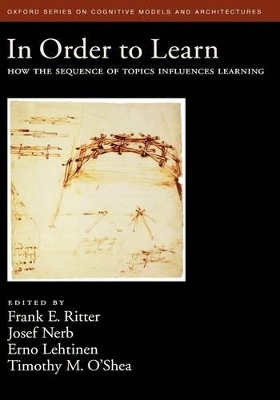
In Order to Learn
Oxford University Press Inc (Verlag)
978-0-19-517884-5 (ISBN)
The order that material, for both facts and skills, is presented or explored by a learner can strongly influence what is learned, how fast performance increases, and sometimes, even that the material is learned at all. In the proposed volume, the contributors argue that these effects are more pervasive and important than they have been treated. They explore some of the foundational topics in this area of intersection between psychology, machine learning, AI, cognitive modelling, education, and instructional design. They include case studies and present numerous questions that will lead to further research projects and provide food for thought for professionals working in these principles.
Frank Ritter helped start the College of Information Sciences and Technology at Penn State, and is affiliated with the psychology, computer science and engineering departments. He also helped start the International Conference on Cognitive Modeling and the tutorial series at the Cognitive Science Conference. He was a Fulbright Scholar at the Technische Universität Chemnitz in 2005. Josef Nerb is Professor of Educational Psychology at the University of Education in Freiburg, Germany, where he also serves as a Vice Dean for teaching and learning. He earned his Ph.D. at the University of Freiburg and did a post-doc at the University of Waterloo, Canada, supported by an Alexander von Humboldt Foundation fellowship. Erno Lehtinen is Vice rector and former Dean of the School of Education at Turku University, where he is a professor of education. He is a past president of the European Association for Research on Learning and Instruction (EARLI). Tim O'Shea is the Principal (President) of the University of Edinburgh. Previously he was Master of Birkbeck College, and professor of information technology and education at the Open University.
SECTION 1. INTRODUCTORY CHAPTERS; SECTION 2. FUNDAMENTAL EXPLANATIONS OF ORDER: EXAMPLE MODELS; SECTION 3. GETTING IN AND OUT OF ORDER: TECHNIQUES AND EXAMPLES FROM EDUCATION AND INSTRUCTIONAL DESIGN; SECTION 4. CONCLUSIONS
| Erscheint lt. Verlag | 16.8.2007 |
|---|---|
| Reihe/Serie | Oxford Series on Cognitive Models and Architectures |
| Zusatzinfo | 72 line illustrations |
| Verlagsort | New York |
| Sprache | englisch |
| Maße | 254 x 178 mm |
| Gewicht | 700 g |
| Themenwelt | Geisteswissenschaften ► Psychologie ► Allgemeine Psychologie |
| Geisteswissenschaften ► Psychologie ► Pädagogische Psychologie | |
| Geisteswissenschaften ► Psychologie ► Test in der Psychologie | |
| Informatik ► Theorie / Studium ► Künstliche Intelligenz / Robotik | |
| ISBN-10 | 0-19-517884-X / 019517884X |
| ISBN-13 | 978-0-19-517884-5 / 9780195178845 |
| Zustand | Neuware |
| Informationen gemäß Produktsicherheitsverordnung (GPSR) | |
| Haben Sie eine Frage zum Produkt? |
aus dem Bereich


